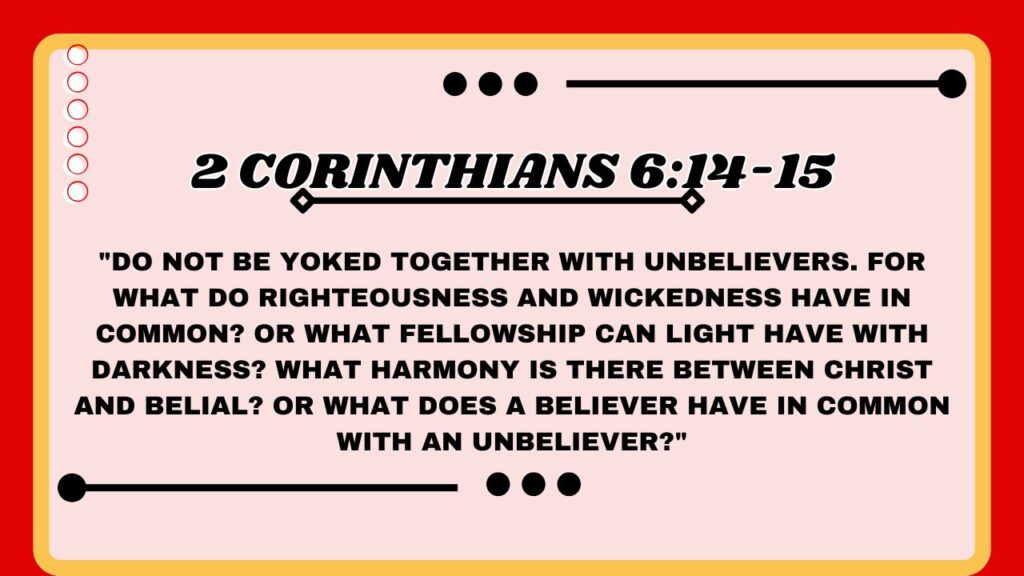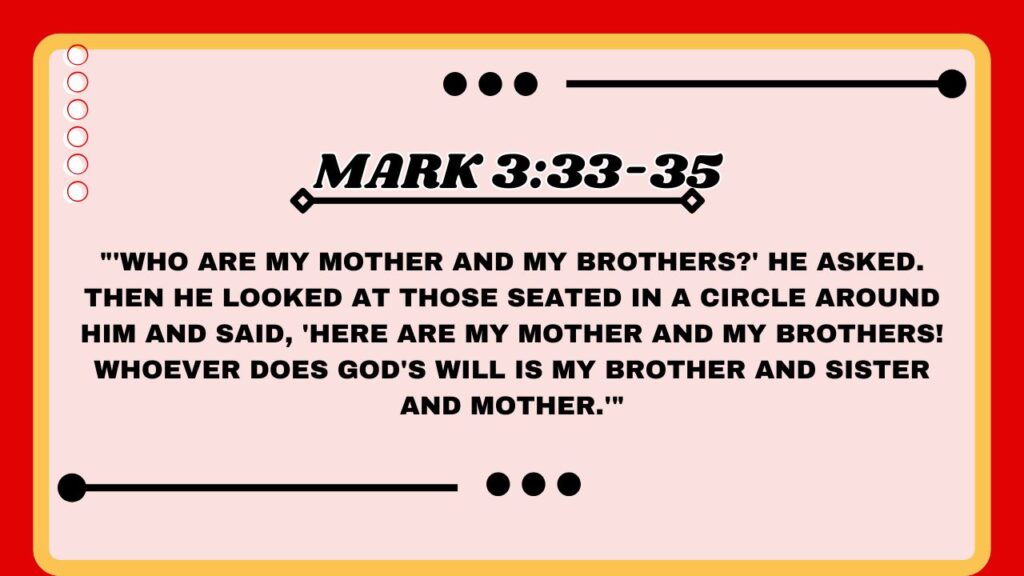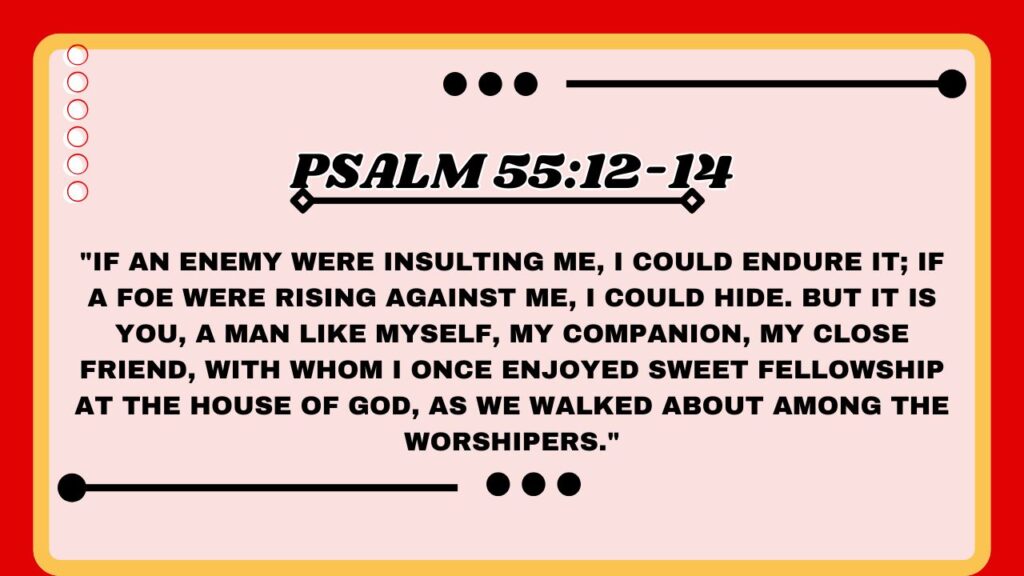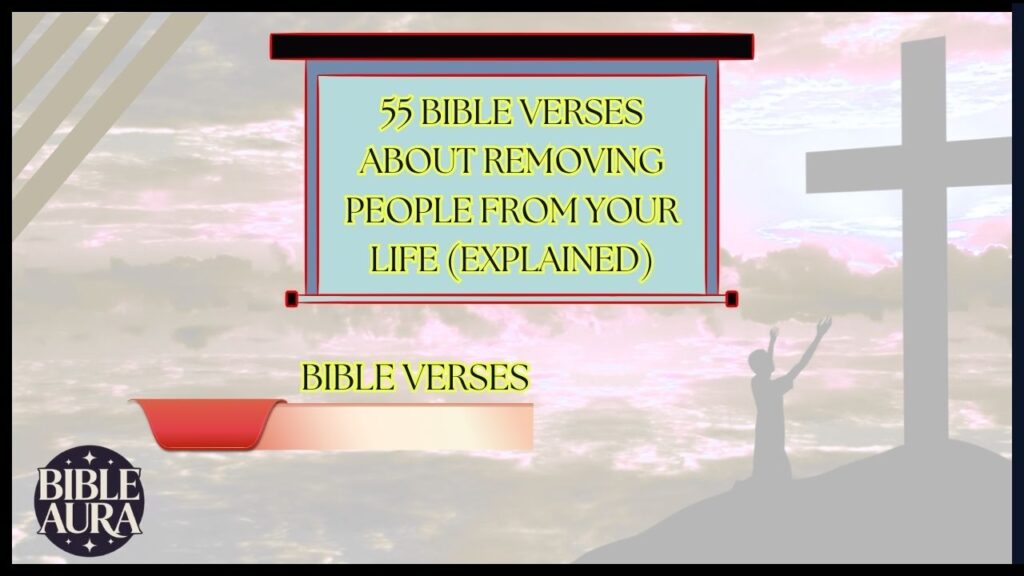Bible Verses About Removing People From Your Life: In our journey through life, we inevitably face difficult decisions about relationships. The Bible offers timeless wisdom about when and how to distance ourselves from certain individuals whose influence may be harmful to our spiritual well-being.
Scripture doesn’t advocate for hasty dismissals of people from our lives, but it does recognize that some relationships can become toxic, harmful, or lead us away from God’s purpose. These biblical principles provide guidance for making these difficult choices with wisdom, discernment, and grace.
God’s Word offers clarity about protecting our spiritual journey while still showing love to all. Let’s explore what the Bible says about setting healthy boundaries and, when necessary, removing harmful influences from our lives.
Also Read: 40 Bible Verses About Clarity (Explained)
When Harmful Influences Threaten Your Faith
1. 1 Corinthians 15:33
“Do not be deceived: ‘Bad company corrupts good character.'”
This straightforward warning reminds us that who we associate with impacts who we become. Paul cautions that continual exposure to negative influences will eventually affect our character and faith. Consider evaluating relationships that consistently pull you away from your values rather than supporting your spiritual growth.
2. Proverbs 13:20
“Walk with the wise and become wise, for a companion of fools suffers harm.”
Solomon highlights the natural consequence of our associations: we become like those we spend time with. This verse encourages seeking relationships with those who demonstrate wisdom while warning that foolish companions lead to harmful outcomes. Seek friends who inspire you to grow in wisdom and faith.
3. 2 Thessalonians 3:6
“In the name of the Lord Jesus Christ, we command you, brothers and sisters, to keep away from every believer who is idle and disruptive and does not live according to the teaching you received from us.”

Paul instructs believers to distance themselves from those who claim faith but live contrary to biblical teachings. This applies particularly to those who are disruptive to the community of faith. When someone’s behavior consistently undermines the church’s unity or your own faith, creating distance may be necessary.
4. Matthew 18:15-17
“If your brother or sister sins, go and point out their fault, just between the two of you. If they listen to you, you have won them over. But if they will not listen, take one or two others along, so that ‘every matter may be established by the testimony of two or three witnesses.’ If they still refuse to listen, tell it to the church; and if they refuse to listen even to the church, treat them as you would a pagan or a tax collector.”
Jesus provides a clear process for addressing harmful behavior within the faith community. This verse shows that separation should only come after attempts at reconciliation, and even then, the goal is eventual restoration. Follow these steps before deciding to remove someone from your life, ensuring you’ve made genuine efforts to resolve issues.
5. Romans 16:17-18
“I urge you, brothers and sisters, to watch out for those who cause divisions and put obstacles in your way that are contrary to the teaching you have learned. Keep away from them. For such people are not serving our Lord Christ, but their own appetites. By smooth talk and flattery they deceive the minds of naive people.”
Paul warns about those who create division within the church community. When someone consistently sows discord or teaches false doctrine, Scripture advises maintaining distance. Be wary of those whose words sound appealing but lead away from biblical truth.
Also Read: 38 Bible Verses About Anointing (Explained)
Protecting Your Peace and Well-being
6. Proverbs 22:24-25
“Do not make friends with a hot-tempered person, do not associate with one easily angered, or you may learn their ways and get yourself ensnared.”
This wisdom highlights how easily we can adopt the negative emotional patterns of those around us. Angry, volatile people can influence our own emotional responses. Consider whether certain relationships are teaching you unhealthy emotional habits that don’t align with the fruit of the Spirit.
7. Psalm 1:1
“Blessed is the one who does not walk in step with the wicked or stand in the way that sinners take or sit in the company of mockers.”
This psalm describes a progression of increasing involvement with negative influences. It begins with casual association, advances to adopting their stance, and culminates in comfortable fellowship with mockers. Examine your relationships to see if any are gradually leading you down a harmful path.
8. Proverbs 4:14-15
“Do not set foot on the path of the wicked or walk in the way of evildoers. Avoid it, do not travel on it; turn from it and go on your way.”
Scripture uses strong language about completely avoiding paths that lead to destruction. Sometimes removing yourself from certain relationships is necessary to avoid being pulled into harmful situations. Identify relationships that consistently lead you toward compromise rather than godliness.
9. 2 Timothy 3:1-5
“But mark this: There will be terrible times in the last days. People will be lovers of themselves, lovers of money, boastful, proud, abusive, disobedient to their parents, ungrateful, unholy, without love, unforgiving, slanderous, without self-control, brutal, not lovers of the good, treacherous, rash, conceited, lovers of pleasure rather than lovers of God having a form of godliness but denying its power. Have nothing to do with such people.”
Paul lists characteristics of those who claim godliness but demonstrate contrary behaviors. This passage advises avoiding those whose lives are characterized by such traits. Evaluate whether certain relationships exhibit these harmful patterns that could negatively impact your faith.
10. Proverbs 20:19
“A gossip betrays a confidence; so avoid anyone who talks too much.”
Trust is essential in healthy relationships. This proverb warns against maintaining close relationships with those who cannot keep confidences. Consider whether certain people in your life consistently betray trust through gossip or spreading private information.
Also Read: 35 Bible Verses About Commitment
Setting Boundaries with Toxic Relationships
11. 2 Corinthians 6:14-15
“Do not be yoked together with unbelievers. For what do righteousness and wickedness have in common? Or what fellowship can light have with darkness? What harmony is there between Christ and Belial? Or what does a believer have in common with an unbeliever?”

Paul uses the metaphor of a yoke a farming implement that binds two animals together to illustrate problematic partnerships. This applies especially to significant life commitments like marriage or business partnerships. Evaluate whether you’re forming deep bonds with those whose fundamental values oppose your faith.
12. Ephesians 5:11
“Have nothing to do with the fruitless deeds of darkness, but rather expose them.”
This verse calls believers to avoid participation in unfruitful actions while standing for truth. When relationships continuously pull you toward behaviors that don’t produce spiritual fruit, it may be time to create distance. Identify relationships that repeatedly pressure you toward choices that contradict your faith.
13. Titus 3:10-11
“Warn a divisive person once, and then warn them a second time. After that, have nothing to do with them. You may be sure that such people are warped and sinful; they are self-condemned.”
Paul provides specific instructions regarding those who create division within the church. This passage shows that separation should only come after attempts at correction. When someone persistently causes conflict despite correction, creating distance becomes appropriate.
14. 1 Corinthians 5:11
“But now I am writing to you that you must not associate with anyone who claims to be a brother or sister but is sexually immoral or greedy, an idolater or slanderer, a drunkard or swindler. Do not even eat with such people.”
Paul specifically addresses relationships with those claiming to be believers while living in ongoing, unrepentant sin. This doesn’t apply to those outside the faith but to those claiming Christ while deliberately continuing in sin. Consider whether you’re enabling harmful behavior by maintaining close fellowship with those living in contradiction to their professed faith.
15. Exodus 23:2
“Do not follow the crowd in doing wrong. When you give testimony in a lawsuit, do not pervert justice by siding with the crowd.”
God warns against following others into wrongdoing, emphasizing the importance of standing for what’s right even when it means standing alone. Evaluate whether certain social groups consistently pressure you to compromise your values for acceptance.
Also Read: 40 Important Bible Verses About Enemies
Forgiveness, Reconciliation, and When to Move On
16. Matthew 5:23-24
“Therefore, if you are offering your gift at the altar and there remember that your brother or sister has something against you, leave your gift there in front of the altar. First go and be reconciled to them; then come and offer your gift.”
Jesus emphasizes the importance of seeking reconciliation when relationships are strained. Before removing someone from your life, ensure you’ve made genuine efforts toward healing the relationship. Take initiative in addressing conflicts, even when you feel you’re not primarily at fault.
17. Romans 12:18
“If it is possible, as far as it depends on you, live at peace with everyone.”
Paul acknowledges that peace isn’t always achievable but encourages doing everything within our power to maintain it. This verse recognizes that sometimes, despite our best efforts, relationships remain broken. Do your part to maintain peace, but recognize when a situation is beyond your control.
18. Matthew 18:21-22
“Then Peter came to Jesus and asked, ‘Lord, how many times shall I forgive my brother or sister who sins against me? Up to seven times?’ Jesus answered, ‘I tell you, not seven times, but seventy-seven times.'”

Jesus teaches that forgiveness should be our consistent practice, not limited by a specific number of offenses. However, forgiveness doesn’t always mean maintaining the same level of relationship. You can forgive someone while still establishing necessary boundaries.
19. Proverbs 26:11
“As a dog returns to its vomit, so fools repeat their folly.”
This graphic proverb illustrates how foolish people return to harmful behaviors even after experiencing their negative consequences. When someone repeatedly demonstrates the same harmful patterns despite opportunities to change, it may indicate a need for distance. Recognize cyclical harmful behaviors that show no signs of changing.
20. Luke 9:5
“If people do not welcome you, leave their town and shake the dust off your feet as a testimony against them.”
Jesus instructed his disciples about when to move on from unreceptive people. This teaches that after making genuine efforts to share truth, there comes a time to recognize when continued engagement is unproductive. Know when to invest your time and energy elsewhere.
Also Read: 48 Bible Verses About Retirement (Explained)
Honoring God in Difficult Relationship Decisions
21. Matthew 10:16
“I am sending you out like sheep among wolves. Therefore be as shrewd as snakes and as innocent as doves.”
Jesus acknowledges that his followers will encounter harmful people and encourages both wisdom and integrity in these interactions. This balanced approach means being discerning about relationships without becoming bitter or vengeful. Maintain your Christian witness even when making difficult relationship decisions.
22. Galatians 6:1
“Brothers and sisters, if someone is caught in a sin, you who live by the Spirit should restore that person gently. But watch yourselves, or you also may be tempted.”
Paul emphasizes restoration as the goal when addressing another’s sin, while also acknowledging the potential danger to ourselves. Before removing someone from your life, consider whether gentle correction might lead to positive change. Also recognize your own vulnerability to similar struggles.
23. 2 Timothy 2:23-24
“Don’t have anything to do with foolish and stupid arguments, because you know they produce quarrels. And the Lord’s servant must not be quarrelsome but must be kind to everyone, able to teach, not resentful.”
Paul advises avoiding pointless debates while maintaining kindness even in disagreement. This teaches that we can create distance from unproductive arguments while still treating others respectfully. Focus on meaningful dialogue rather than circular arguments that only create division.
24. Ephesians 4:31-32
“Get rid of all bitterness, rage and anger, brawling and slander, along with every form of malice. Be kind and compassionate to one another, forgiving each other, just as in Christ God forgave you.”
Even when creating distance from harmful relationships, we’re called to maintain an attitude of forgiveness. Removing someone from your life shouldn’t be done with bitterness or vengeance. Check your heart to ensure your motivations are healthy rather than vindictive.
25. Colossians 3:13
“Bear with each other and forgive one another if any of you has a grievance against someone. Forgive as the Lord forgave you.”
Paul encourages patience with others’ faults and a forgiving spirit that reflects God’s forgiveness toward us. Before removing someone from your life, consider whether the issue might be resolved through greater patience and grace. Some relationships require more forbearance than others.
Also Read: 51 Bible Verses About Butterflies
Wisdom for Family Relationships
26. Mark 3:33-35
“‘Who are my mother and my brothers?’ he asked. Then he looked at those seated in a circle around him and said, ‘Here are my mother and my brothers! Whoever does God’s will is my brother and sister and mother.'”

Jesus redefined family beyond biological ties, emphasizing spiritual bonds. While not advocating abandoning family responsibilities, this passage recognizes that spiritual connections can be stronger than blood relations. Understand that even family relationships may require boundaries when they become harmful.
27. Luke 14:26
“If anyone comes to me and does not hate father and mother, wife and children, brothers and sisters yes, even their own life such a person cannot be my disciple.”
Using Hebraic hyperbole, Jesus emphasizes that loyalty to Him must surpass even family ties. This doesn’t advocate actual hatred but comparative priority. When family relationships demand compromise of your faith, your primary loyalty must be to Christ. Remember that following Jesus sometimes creates tension in family relationships.
28. 1 Timothy 5:8
“Anyone who does not provide for their relatives, and especially for their own household, has denied the faith and is worse than an unbeliever.”
Paul emphasizes our responsibility to care for family members. Even when relationships are strained, certain obligations remain. Consider whether distancing yourself still allows for fulfilling necessary responsibilities toward family members.
29. Matthew 10:34-36
“Do not suppose that I have come to bring peace to the earth. I did not come to bring peace, but a sword. For I have come to turn ‘a man against his father, a daughter against her mother, a daughter-in-law against her mother-in-law a man’s enemies will be the members of his own household.'”
Jesus acknowledges that following Him can create division even within families. This passage recognizes the painful reality that faith commitments sometimes create relational tension. Understand that some family conflict may be unavoidable when values fundamentally differ.
30. Genesis 2:24
“That is why a man leaves his father and mother and is united to his wife, and they become one flesh.”
This verse establishes the principle of leaving one family unit to form another. While not addressing toxic relationships directly, it establishes that even the closest family bonds undergo transformation. Recognize that healthy development sometimes requires creating appropriate distance from family of origin.
Also Read: 53 Bible Verses About Resilience (Explained)
Dealing with Abusive or Dangerous Situations
31. Psalm 120:1-2
“I call on the Lord in my distress, and he answers me. Save me, Lord, from lying lips and from deceitful tongues.”
This psalm expresses the pain of dealing with deception and calls on God for deliverance. When relationships are characterized by persistent dishonesty, seeking God’s intervention is appropriate. Don’t hesitate to pray specifically about relationships marked by manipulation and deceit.
32. Proverbs 14:7
“Stay away from a fool, for you will not find knowledge on their lips.”
This direct instruction warns against close association with those who lack wisdom. When someone consistently demonstrates foolish choices and refuses correction, creating distance protects you from their negative influence. Seek relationships that contribute to your growth in wisdom.
33. Psalm 55:12-14
“If an enemy were insulting me, I could endure it; if a foe were rising against me, I could hide. But it is you, a man like myself, my companion, my close friend, with whom I once enjoyed sweet fellowship at the house of God, as we walked about among the worshipers.”

David expresses the particular pain of betrayal from a close friend. This psalm acknowledges that sometimes our deepest wounds come from those nearest to us. When trusted relationships become sources of harm, it’s appropriate to recognize the changed nature of the relationship.
34. Proverbs 22:10
“Drive out the mocker, and out goes strife; quarrels and insults are ended.”
This proverb recognizes that removing certain individuals from a situation can resolve ongoing conflict. In community settings, this may mean creating distance from those who consistently create discord. Consider whether certain relationships are the primary source of ongoing conflict in your life.
35. Psalm 101:7
“No one who practices deceit will dwell in my house; no one who speaks falsely will stand in my presence.”
David establishes standards for those he allows in his close circle. This psalm supports the principle of creating boundaries with those who demonstrate dishonesty. Establish clear expectations for integrity in your close relationships.
Also Read: 40 Bible Verses About Blooming Where You Are Planted
Balancing Grace with Wisdom
36. Matthew 7:6
“Do not give dogs what is sacred; do not throw your pearls to pigs. If you do, they may trample them under their feet, and turn and tear you to pieces.”
Jesus uses strong imagery to warn against sharing valuable spiritual truths with those who will only despise them. This teaches discernment about where we invest our spiritual energy. Consider whether certain relationships repeatedly reject or mock your attempts to share meaningful truth.
37. Proverbs 25:26
“Like a muddied spring or a polluted well are the righteous who give way to the wicked.”
This proverb illustrates how compromising with wickedness contaminates our witness. When we fail to establish appropriate boundaries, our testimony becomes unclear. Evaluate whether certain relationships are pressuring you to compromise in ways that diminish your spiritual influence.
38. Jude 1:22-23
“Be merciful to those who doubt; save others by snatching them from the fire; to others show mercy, mixed with fear hating even the clothing stained by corrupted flesh.”
Jude advises different approaches for different situations, including showing mercy while being careful not to be contaminated by sin. This balanced approach recognizes both compassion and caution. Develop discernment about when to engage more deeply and when to maintain safe distance.
39. Galatians 6:9-10
“Let us not become weary in doing good, for at the proper time we will reap a harvest if we do not give up. Therefore, as we have opportunity, let us do good to all people, especially to those who belong to the family of believers.”
Paul encourages persistent goodness while acknowledging we may grow weary. This reminds us to prioritize our limited energy, particularly toward fellow believers. Recognize when relationship efforts are depleting you beyond healthy limits and adjust your involvement accordingly.
40. 2 Timothy 2:25-26
“Opponents must be gently instructed, in the hope that God will grant them repentance leading them to a knowledge of the truth, and that they will come to their senses and escape from the trap of the devil, who has taken them captive to do his will.”
Paul emphasizes gentle instruction when dealing with opposition, recognizing that God’s work in someone’s heart is the true source of change. Before removing someone from your life, consider whether patient teaching might still bear fruit. Remember that spiritual transformation often takes time.
Also Read: 56 Important Bible Verses About Overcoming
Finding Peace in Difficult Decisions
41. Philippians 4:7
“And the peace of God, which transcends all understanding, will guard your hearts and your minds in Christ Jesus.”

Paul promises that God’s peace will protect us as we make difficult decisions. When wrestling with relationship boundaries, seek God’s guidance and trust His peace to confirm your direction. Allow God’s peace, rather than others’ opinions, to be your guide in relationship decisions.
42. Isaiah 26:3
“You will keep in perfect peace those whose minds are steadfast, because they trust in you.”
Isaiah connects peace with trust in God rather than changing circumstances. When facing difficult relationship decisions, focus on God’s unchanging character rather than uncertain outcomes. Trust that God sees the bigger picture when you must make painful relationship choices.
43. John 14:27
“Peace I leave with you; my peace I give you. I do not give to you as the world gives. Do not let your hearts be troubled and do not be afraid.”
Jesus distinguishes His peace from what the world offers. The world often advocates for peace at any price, including unhealthy compromise. Christ’s peace may sometimes require difficult decisions that temporarily create tension. Trust Jesus’ gift of peace even when it differs from the world’s definition.
44. Romans 14:19
“Let us therefore make every effort to do what leads to peace and to mutual edification.”
Paul emphasizes pursuing both peace and mutual growth in relationships. When relationships consistently undermine either peace or spiritual growth, reevaluation is appropriate. Assess whether certain relationships contribute to or detract from your spiritual development.
45. Psalm 34:14
“Turn from evil and do good; seek peace and pursue it.”
This psalm connects peace with turning from evil, showing that true peace sometimes requires difficult choices. Seeking peace doesn’t always mean avoiding conflict; sometimes it means addressing harmful situations. Pursue genuine peace that comes from right relationships, not merely the absence of conflict.
Also Read: 40 Amazing Bible Verses About Sunsets
Learning from Biblical Examples
46. Genesis 13:8-9
“So Abram said to Lot, ‘Let’s not have any quarreling between you and me, or between your herders and mine, for we are close relatives. Is not the whole land before you? Let’s part company. If you go to the left, I’ll go to the right; if you go to the right, I’ll go to the left.'”
Abraham chose geographical separation to preserve relationship with Lot when their households experienced conflict. This demonstrates that sometimes physical distance can prevent deterioration of important relationships. Consider whether creating space might actually preserve a relationship rather than destroy it.
47. Acts 15:36-40
“Some time later Paul said to Barnabas, ‘Let us go back and visit the believers in all the towns where we preached the word of the Lord and see how they are doing.’ Barnabas wanted to take John, also called Mark, with them, but Paul did not think it wise to take him, because he had deserted them in Pamphylia and had not continued with them in the work. They had such a sharp disagreement that they parted company. Barnabas took Mark and sailed for Cyprus, but Paul chose Silas and left…”
Paul and Barnabas separated over a disagreement about Mark, demonstrating that even godly people sometimes need space from each other. Their later reconciliation shows that separation doesn’t have to be permanent. Recognize that temporary separation can sometimes lead to eventual restoration of relationships.
48. 1 Samuel 19:9-10
“But an evil spirit from the Lord came on Saul as he was sitting in his house with his spear in his hand. While David was playing the lyre, Saul tried to pin him to the wall with his spear, but David eluded him as Saul drove the spear into the wall. That night David made good his escape.”
David fled from Saul’s presence when his life was threatened, showing that self-preservation from danger is biblically appropriate. When relationships become dangerous, immediate distance is not only permissible but necessary. Prioritize safety when relationships become physically or emotionally threatening.
49. Matthew 2:13-14
“When they had gone, an angel of the Lord appeared to Joseph in a dream. ‘Get up,’ he said, ‘take the child and his mother and escape to Egypt. Stay there until I tell you, for Herod is going to search for the child to kill him.’ So he got up, took the child and his mother during the night and left for Egypt.”

Joseph fled with Mary and Jesus to protect them from Herod’s threat, demonstrating that protecting loved ones sometimes requires removing them from harmful people. God sometimes directs us to create distance for protection. Listen for God’s guidance about when to remain and when to create distance.
50. 3 John 1:9-10
“I wrote to the church, but Diotrephes, who loves to be first, will not welcome us. So when I come, I will call attention to what he is doing, spreading malicious nonsense about us. Not satisfied with that, he even refuses to welcome other believers. He also stops those who want to do so and puts them out of the church.”
John confronts a church leader who was abusing his position and harming others. This example shows that even those in spiritual authority can sometimes become harmful influences. Be willing to recognize toxic leadership and create appropriate boundaries.
Also Read: 55 Important Bible Verses About Sports
Trusting God Through Difficult Transitions
51. Ecclesiastes 3:1,5b-6a
“There is a time for everything, and a season for every activity under the heavens… a time to embrace and a time to refrain from embracing, a time to search and a time to give up…”
Solomon acknowledges that life involves different seasons, including times to draw near and times to create distance. This wisdom recognizes that relationships also have seasons. Trust God’s timing for when to invest more deeply in relationships and when to step back.
52. Isaiah 43:18-19
“Forget the former things; do not dwell on the past. See, I am doing a new thing! Now it springs up; do you not perceive it? I am making a way in the wilderness and streams in the wasteland.”
Isaiah encourages looking forward to God’s new work rather than fixating on the past. When relationships change or end, focus on God’s continuing work in your life. Trust that God can bring unexpected good from painful relationship transitions.
53. Philippians 3:13-14
“Brothers and sisters, I do not consider myself yet to have taken hold of it. But one thing I do: Forgetting what is behind and straining toward what is ahead, I press on toward the goal to win the prize for which God has called me heavenward in Christ Jesus.”
Paul emphasizes moving forward rather than being defined by the past. When relationships have ended, continue pursuing God’s purpose rather than becoming stuck in what was. Keep your focus on God’s calling even when relationships change.
54. Joshua 1:9
“Have I not commanded you? Be strong and courageous. Do not be afraid; do not be discouraged, for the Lord your God will be with you wherever you go.”
God encourages Joshua with the promise of His presence through change and challenge. When making difficult relationship decisions, remember that God remains with you. Draw courage from God’s presence rather than human approval.
55. Psalm 32:8
“I will instruct you and teach you in the way you should go; I will counsel you with my loving eye on you.”

God promises personal guidance and watchful care. When uncertain about relationship decisions, seek God’s wisdom through prayer, Scripture, and godly counsel. Trust that God sees your situation clearly and will guide your steps.
Conclusion: Bible Verses About Removing People From Your Life
Scripture reveals that while relationships are precious gifts from God, not all connections are meant to be permanent. The Bible offers wisdom for discerning when relationships have become harmful to our spiritual well-being and provides guidance for creating appropriate boundaries.
These verses demonstrate that removing someone from your life should never be done hastily or vindictively. Instead, such decisions should be made with prayer, wisdom, and a genuine attempt at reconciliation when possible. Even when separation becomes necessary, our attitudes should reflect Christ’s love and forgiveness.
Remember that God’s ultimate goal is your spiritual growth and well-being. Sometimes this growth requires painful pruning of relationships that hinder your walk with Him. Trust that God sees the bigger picture and will guide you through these difficult decisions with His wisdom and presence.
Practical Application: Using These Verses in Your Life
Prayerful Reflection Process
- Journal through these verses: Select 3-5 verses that particularly speak to your situation and spend time writing about how they apply.
- Create a prayer guide: Use these scriptures as prompts for specific prayers about difficult relationships.
- Seek godly counsel: Share relevant verses with trusted spiritual mentors who can help you apply biblical wisdom to your specific circumstances.
Healthy Communication Approaches
- Scripture-based conversations: When possible, use biblical principles to frame difficult conversations about relationship boundaries.
- Letter writing: For situations where direct conversation is unwise, consider writing a thoughtful letter explaining your need for distance, grounded in Scripture.
- Setting clear boundaries: Use biblical principles to establish and communicate clear, healthy boundaries in challenging relationships.
Healing and Growth
- Memorize key verses: Internalize scriptures that affirm God’s guidance during difficult transitions.
- Bible study focus: Spend time studying biblical characters who navigated relationship challenges successfully.
- Support groups: Connect with others who are applying biblical wisdom to similar relationship challenges.
Frequently Asked Questions
Does the Bible really support cutting people out of your life?
The Bible acknowledges that there are times when creating distance from harmful influences is necessary for spiritual well-being. However, Scripture emphasizes attempting reconciliation when possible and maintaining an attitude of forgiveness even when relationships change. The goal is always restoration when safe and possible, but Scripture recognizes that some relationships become destructive and require boundaries.
How can I know if I should remove someone from my life or just set better boundaries?
Pray for wisdom and discernment, seeking God’s guidance through Scripture, prayer, and godly counsel. Consider whether the relationship consistently pulls you away from God’s purposes or endangers your physical, emotional, or spiritual health. Sometimes establishing clearer boundaries can heal a relationship, while other situations may require more complete separation.
What if the toxic person is a family member?
Family relationships include special obligations, but Scripture acknowledges that even family ties may sometimes become harmful. Matthew 10:34-36 recognizes that following Christ can create division even within families. While honoring parents and caring for family remains important, this doesn’t mean enabling harmful behavior or submitting to abuse. Seek wisdom about maintaining appropriate boundaries while fulfilling necessary family responsibilities.
How do I remove someone biblically without harboring bitterness?
Focus on forgiveness as an ongoing process, even when creating distance. Pray for the person regularly, asking God to bless them and work in their lives. Examine your heart for resentment and surrender it to God. Remember that creating distance can sometimes be an act of love rather than punishment, allowing both parties space for growth and potential future reconciliation.
Can I reconcile with someone I’ve removed from my life?
Absolutely. Paul and Mark’s story (Acts 15 and later 2 Timothy 4:11) demonstrates that relationships can be restored after separation. Reconciliation becomes possible when genuine change has occurred and trust can be rebuilt. Pray for discernment about timing and approach, looking for evidence of true transformation rather than merely temporary behavior changes.
Read more knowledgeable blogs on Bible Aura

Piper McMillan is a passionate writer and educator dedicated to sharing the beauty and depth of the Bible. As the author behind the Piper McMillan website, she explores Bible verses, unlocks biblical narratives, and provides insights for living a Christ-centered life. Through warm, approachable, and inspiring articles, Piper guides readers to deepen their understanding of Scripture and apply its timeless wisdom to daily living. Her mission is to uplift, educate, and help others walk faithfully with God, rooted in His word.



